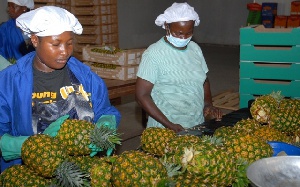Organic farming is the best way to feed the future, Mr Samuel Nettey, a research scientist at the Biotechnology and Nuclear Agriculture Research Institute (BNARI) of the Ghana Atomic Energy Commission (GAEC), has said.
He said organic farming is a systematic approach based upon a set of processes resulting in a sustainable ecosystem, safe food, good nutrition and social justice.
Mr Nettey was speaking to the Ghana News Agency on the sidelines of a day’s workshop for the GAEC Farmers Association, including mango and pineapple growers from the Greater Accra and Eastern Regions.
The workshop was organised by BNARI in collaboration with the GAEC Technology Transfer and Marketing Centre for 40 participants to educate them on the use of compost in organic farming.
The event was on the theme: “Nutrient recovery from solid waste management for agriculture soil amendment.”
Mr Nettey said organic farming is very important for sustaining the environment as well as contributing to healthy living for the consumer of organic produce.
"It contributes in job creation, food security, poverty reduction and improves livelihoods in general; therefore, it is incumbent on all of us to create and promote the business environment of the organic farming,” he said.
Mr Nettey said organic farming is being practiced consciously (certified or non-certified) or unconsciously in most rural areas in Ghana.
He said there is limited coordination and education or sharing of knowledge on organic farming in the country; adding that the Ministry of Food and Agriculture has not provided clear policy direction and support for organic farming but it emphasizes on sustainable land and environmental management.
Mr Nettey said the Deutsche Gesellschaft für Internationale Zusammenarbeit (GIZ) initiated the Green Label- which emphasized organic or minimal fertilizer and pesticide inputs - only on a pilot basis in Accra and Tema.
He said crops that are produced organically in the country include various indigenous fruits and leafy vegetables, onions, cereals, water melon, grain legumes and sweet potato.
He said in Ghana, the land area for the production of these crops ranges mostly from one acre to five acres; and that organic produce are not recognized as organic produce, hence, they do not attract any premium prices.
Mr Nettey said besides, the main market source for organic produce is the open market where they compete with non-organic produce for the same price; hence, the organic farmers are not able to realize the full potential of their business.
He appealed to the government and other stakeholders to create a more congenial atmosphere for the growth of the organic farming industry adding that BNARI was at the moment producing compost for sale at affordable prices for organic farming.
Business News of Saturday, 30 January 2016
Source: GNA
‘Organic farming is the best way to feed the future’
Entertainment












